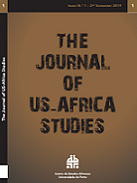US Policy towards the Maghreb: An Arduous Combination of Strategic Interests and Economic Stakes
Abstract
The relations of the United States of America (USA) with the Maghreb States are ancient, though intermittent and not very substantial. Globally, the Maghreb does not constitute a vital region for US strategic concerns. It is included broadly in what the American policy makers depict as the Middle East and North Africa (MENA) configuration and thus does not represent a
specific or a peculiar zone for American involvement or responsibility.
However, the Maghreb presents a relative importance in the US designs whether in terms of strategic concerns or economic assets, particularly with the worldwide emergence of terrorism. This care remains only provisory. Strategic alignments (Morocco and Tunisia) and energy resources (Algeria and Libya) have relatively attracted US attention to the Maghreb, but security matters, linked to the widespread of terrorism, have strengthened the relations between the two parties, without, however, upgrading their partnership to the level of vitally crucial dynamics, interdependent needs, and promising prospects.
Keywords: Economic Cooperation; Maghreb; Radical Islam; Terrorism; USA





